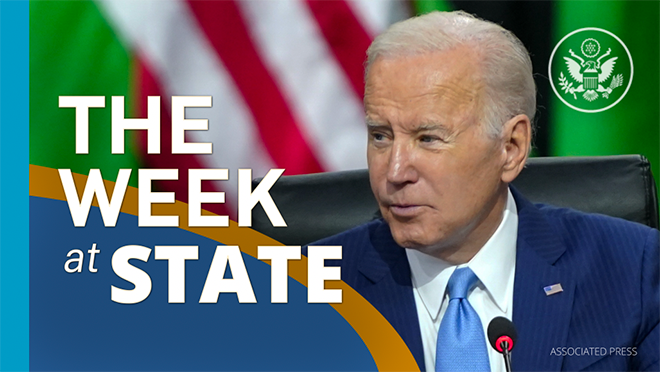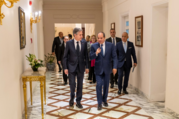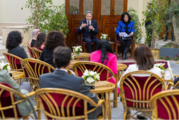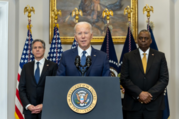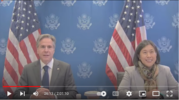Antony J. Blinken, Secretary of State
Jerusalem
Waldorf Astoria Hotel
SECRETARY BLINKEN: Good afternoon. So we’ve had a busy few days at a pivotal time for the region. The United States is determined to work with our partners to foster a more stable, secure, and prosperous Middle East. The horrific terrorist attacks in Jerusalem, the escalation of violence on the West Bank have underscored the significant challenges to security and stability that the region faces and that we face.
We began this trip in Cairo, where I met with President Sisi and Foreign Minister Shoukry as well as with Egyptian human rights defenders and young leaders. Among a wide range of issues in my meetings with the government, we discussed the role Egypt and other neighbors can play in helping Israel and the Palestinians de-escalate, reduce tensions, and lay the foundation for a more peaceful path.
Upon arriving in Israel, I expressed my condolences and those of the American people to Israel and to the families of the seven civilians who were killed in the horrific terrorist attack outside a synagogue in Neve Yaakov. In the wake of this and the subsequent attack on an Israeli father and son, I reaffirmed to Israel and its people the United States’ ironclad commitment to Israel’s security.
A rising tide of violence has resulted in the loss of many innocent lives on both sides. As I discussed with Prime Minister Netanyahu and President Abbas and everyone I met in Israel and the West Bank during this visit, all sides must take steps to prevent further escalation in violence and restore calm. That’s the only way that we can create conditions in which people’s sense of security will start to improve and fear can start to recede.
Across my meetings with Israel’s Government, the Palestinian Authority, our partners in Cairo, I heard a deep concern about the current trajectory. But I also heard constructive ideas for practical steps that each side can take to lower the temperature, to foster greater cooperation, to bolster people’s security. And so I’ve asked senior members of my team to stay on in the region and continue discussions on how these steps might actually be advanced.
These are the steps that the parties themselves must lead on, and we have no illusions that heightened tensions can be defused overnight. But we’re prepared to support efforts here and with partners in the region if the parties have the will to do so. The United States is always ready and willing to be a partner in the cause of peace and security.
On my return home and in the coming days, I’ll also continue to engage with partners in the broader region who share our serious concerns about the escalating cycle of violence and like us want to support the parties in finding a way forward.
So restoring calm is our immediate task, but over the longer term we have to do more than just lower tensions. The United States is committed to working toward our enduring goal of ensuring that the Palestinians and Israelis enjoy equal measures of freedom, security, opportunity, justice, and dignity. And it’s President Biden’s firm conviction that the only way to achieve that goal is through preserving and then realizing the vision of two states for two peoples. The United States will continue to oppose anything that puts that goal further from reach, including but not limited to settlement expansion, legalization of illegal outposts, a move towards annexation of the West Bank, disruption to the historic status quo on Jerusalem’s holy sites, demolitions and evictions, and incitement and acquiescence to violence.
We will also support all efforts to move us closer to peace, expand the horizon of hope, advance equal rights and opportunities for Palestinians and Israelis. That includes building on the efforts that we’ve made over the past two years to improve the lives of the Palestinian people in concrete ways.
We bolstered our assistance to the United Nations Relief and Works Agency for Palestinian refugees, UNRWA, including approximately $50 million in new funding that I announced today in Ramallah, enabling the provision of essential services like food, vaccines, education, as well as vital aid for refugees. That brings U.S. total funding for Palestinians over the last two years to nearly $940 million. We’re supporting quality health care through the East Jerusalem Hospital Network, and we’re making real progress toward implementing an agreement to provide a 4G network in the Palestinian territories.
We’re also working to broaden and deepen the circle of peace between Israel and its neighbors. As we demonstrated earlier this month when U.S. officials joined representatives from Israel, Bahrain, Egypt, Morocco, the United Arab Emirates for the first meeting of the Negev Forum Working Groups. Again, this was the largest assemblage of officials from Arab countries and Israel since Madrid, going back many decades.
On crucial issues like food and water security, clean energy, regional security, our efforts are creating collaboration that will improve the lives and livelihoods of people across the region and erode longstanding biases and distrust.
Even as we’re making real strides toward expanding peace with Israel’s neighbors, we continue to work together to tackle shared threats. This morning, Minister of Defense Gallant and I discussed ways to deepen our cooperation to confront and counter the Iranian regime’s destabilizing actions in the region and beyond. I also met with opposition leader Lapid, who shares the same commitment to counter Iran.
Tehran’s deepening ties with Moscow and the sophisticated weaponry that they’re exchanging to enable one another’s aggression are among the many reasons that we’ve raised with Israel the importance of providing support for all of Ukraine’s needs – humanitarian, economic, and security – as it defends its people against Russia’s brutal war of aggression.
We discussed a number of ways to advance the United States’ and Israel’s shared security interests, just as I did yesterday in my meeting with the prime minister, with President Herzog, and with Foreign Minister Cohen. Across these discussions, I made clear that America’s commitment to Israel’s security is unwavering, just as it has been for nearly 75 years.
Finally, the United States will continue to deepen our bonds here with partners outside of government. Today I had the opportunity to spend time with Palestinian and Palestinian American civil society leaders, entrepreneurs, business owners in Deir Dibwan who shared the vital work they are doing to improve the lives of their communities. And I started my day by hearing from a group of young Israeli leaders, Jews and Arabs, who are doing inspiring and critical work, from advancing LGBTQ rights and the rights of people with disabilities to building trust and ties between communities.
These meetings were a reminder that the civil society in both of our countries plays an indispensable role – an indispensable role in defending and strengthening the rights of – and principles at the heart of a free and open society, and helping people tackle some of their most pressing challenges. It’s a reminder of how citizens are willing to continue to engage, to hold their leaders accountable, and to keep working to create the world that they and their communities want. They can count on the United States in a partner in all of those endeavors.
With that, I’m happy to take some questions.
MR PRICE: We’ll start with Tracy Wilkinson of The LA Times.
QUESTION: Hi.
SECRETARY BLINKEN: Tracy.
QUESTION: Thank you, Mr. Secretary. Thank you for taking this time, because I know you have had a couple of very busy days. We can all bear witness.
You just mentioned the deep concern over the trajectory that you saw here. And in your meetings both with Israeli officials and people and Palestinian officials and people, I wanted to dig a little deeper into that. Do you concur with or at least understand Israelis who fear that some of the new – some of the actions of their new government threaten democracy here? And after meeting with – with Prime Minister Netanyahu, do you believe that he can and wants to preserve democracy?
And on the Palestinian side, Palestinians are increasingly disillusioned with the two-state solution. Many have given up on it, convinced that Israel will never let it happen, yet you continue to advocate it, as you just did a minute ago. After meeting with President Abbas, do you think he is the person to resolve the statehood issue, to defuse the tensions, and to fight terrorism? In other words, do you have confidence in him and in the Palestinian Authority? Thank you.
SECRETARY BLINKEN: Thanks. Let me take the second part of the question first and then come to the first part. Look, as always, we’re focused on the policies that governments, administrations pursue, not individual personalities. And so we’re focused on what the Palestinian Authority is doing both to work to improve the lives of the Palestinian people as well as to engage responsibly with Israel on, first and foremost, defusing the current situation, the current cycle of violence; reducing tensions, not escalating them; calming things down, not ramping things up. That is the immediate focus. And I heard both from Palestinians, including President Abbas, as well as from Israelis some ideas for how that – how we can move that forward, which is why I asked some of my colleagues to stay behind to support the efforts that are being made to calm things down.
That’s really the first order of business. And my hope is that if that succeeds, then we can look to both sides to take some positive steps to try to rebuild confidence, rebuild trust, and that in turn lays the foundation for at some point pursuing two states. But I think in this moment the most immediate challenge is, as I said, defusing the cycle of violence that has people here, first and foremost, but around the region deeply, deeply concerned. As I said, the President – President Biden – remains committed to and convinced of the importance of a two-state solution, but one step at a time. We have to focus first on making sure that Israelis and Palestinians defuse the current situation and then start to build some positive steps into their relationship.
With regard to the first part of the question – and I think you heard me address this yesterday – the relationship that we have with Israel is based fundamentally on shared interests and shared values, and it’s been that way for 75 years. I spoke about some of those values yesterday, including, of course, respect for human rights, equal justice under the law, equal rights for all, the rule of law, free press, a robust civil society. And as I mentioned, I had an opportunity to engage with some representatives of civil society just today. And to be sure, Israel has a very robust civil society, and we’ve seen that in recent days. And again, I saw that today in my own meetings.
With regard to the proposed reforms, there’s clearly a very vibrant debate that’s going on, a discussion that’s going on in Israel, and these debates are a very healthy part of a vibrant democracy. In fact, they’re unique to democracies. And as democracies, one of the things that we recognize is that building consensus on new proposals is the best way to make sure that not only are they embraced but that they actually endure. All of this, of course, is for Israelis themselves to work out, but we look forward, generally speaking, to working with Israel to advance the interests and values that have been at the heart of this relationship, as I said, for 75 years.
MR PRICE: Gili Cohen of Kan News.
QUESTION: Thank you, Secretary, for doing this. Following the legislative reform, several members of the Israeli coalition, including one minister, has said after your comments yesterday with Prime Minister Netanyahu that the Israeli prime minister doesn’t need a lesson in democracy. I wonder what you think about such comments. And also, Secretary, have you received any assurance from Netanyahu about how he going to implement this plan?
And another question regarding the escalation: Prime minister office announced after the terror attacks that they will promote steps to strengthen the settlements and even increase the number of guns held by citizens. Do you think that this might contribute to another escalation? Thank you.
SECRETARY BLINKEN: Two things. What I talked about yesterday and again talked about just now reflects the shared values that the United States and Israel have had and held for more than 75 years, and it is nothing more and nothing less than that. And I continue to be inspired by the vibrancy with which Israel shares those values, something that, again, we’re seeing right now, and I think I can say the same thing about my own country, the United States.
With regard to the second part of your question, we have been clear and consistent in our conviction that neither side should take any unilateral actions that, right now, potentially would add fuel to a fire and, over the medium to long term, would make the prospects of achieving two states even more distant than they currently are.
MR PRICE: Will Mauldin, Wall Street Journal.
QUESTION: Thank you so much for doing this. I wanted to ask you, in your meetings with Prime Minister Netanyahu and Defense Minister Gallant, if any new issues or overlap came up in the issue of Iran? Any new ideas for U.S. policy after the failure of the JCPOA talks to make headway? And did you express support for those – their efforts to target Iran’s hardware (inaudible) nuclear bombs or for cooperating with Russia militarily?
Also just wanted to ask you a Palestinian question. Do you think you’ve made any headway here? You said you had some ideas that were aired. Would you like to share any of those with the press or with the American public?
SECRETARY BLINKEN: Thank you. On Iran, we have – Israel and the United States – a shared commitment. One, that Iran not acquire a nuclear weapon, and two, that we continue to stand together with other countries as well against the many destabilizing and dangerous actions that Iran is engaged in in the region, and now, increasingly, beyond. One of those actions is – that we talked about was the provision by Iran to Russia of drones, technology to be used in Russia’s aggression against Ukraine.
And as I mentioned before and as we also discussed with our Israeli counterparts, this is a two-way street. Not only is Iran providing sophisticated military equipment to Russia, but Russia in turn is doing the same with Iran, which is, of course, of real concern to us and real concern to Israel.
So we continued what has been an ongoing discussion of ways that we can continue to work together, collaborate – and not just us – with other countries – in countering the malicious actions that Iran is engaged in, whether it’s in this region or beyond.
With regard to what I heard on this trip, no, I’m not going to detail the ideas. But I think there are some concrete ideas from both sides that, if pursued, would really help diffuse the current situation, and it’s why I asked some of my colleagues to stay behind to support the efforts that both parties are making to try to get to a better path.
It is fundamentally up to them. They have to work together to find a path forward that, as I said, both diffuses the current cycle of violence and, I hope, also leads to positive steps that each can take to build back some trust, to build back some confidence, to help make material improvement in people’s lives, to foster a greater sense of security for Israelis and Palestinians alike. That will take time. The immediate task, as I said, is to diffuse this cycle of violence. And if both sides are genuinely committed to it, I think there are steps that they can take and that we heard from them that would help achieve that.
MR PRICE: We have time for a final question from Lana Kamleh.
QUESTION: Good evening. I’m Lana Kamleh (inaudible) first let me thank you for giving me the opportunity to speak here on behalf of my colleagues in Palestine TV. (Inaudible) from working in East Jerusalem for the third year in a row. I would like to remind you of the phone call between President Abbas and President Biden in May 2021 and the meetings that followed highlighting the importance of halting unilateral measures such as settlement activity, killing, house demolition, and the attacks on Al-Aqsa Mosque, et cetera. What (inaudible) this government to stop such unilateral actions difficult? Thank you.
SECRETARY BLINKEN: Thank you. All I can tell you is that we have long been and remain opposed to unilateral steps by either side that, in the first instance, actually fuel tensions and lead to I think a more dangerous environment for everyone, and that fundamentally make more difficult and more distant the prospect of moving toward two states. So that hasn’t changed. I repeated that in my meetings throughout my stay here, as I just did now. And again, we look to both sides not to take steps that actually make things worse, and as well to take some positive steps that can create a better path forward for both Israelis and Palestinians.
MR PRICE: Thank you, Mr. Secretary.
SECRETARY BLINKEN: Thanks.
MR PRICE: Thank you, everyone.
SECRETARY BLINKEN: Thank you.


